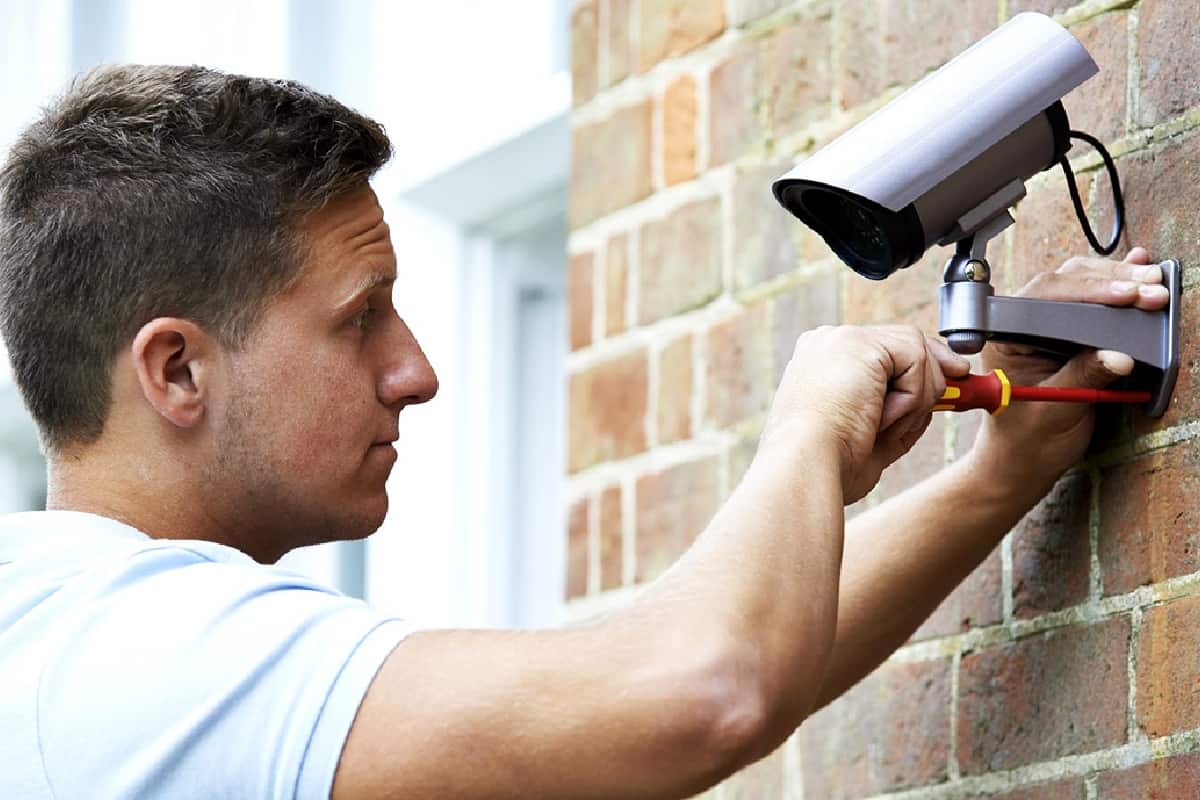The Evolution of Home Security: From Watchdogs to AI Surveillance
In the ever-changing world of home security, there has been a remarkable evolution from the traditional watchdogs to the modern marvel of AI surveillance. Gone are the days of relying solely on the loyalty and instincts of our four-legged companions; today, cutting-edge technology has revolutionized the way we protect our homes. This article explores the fascinating journey that has led us to the seamless integration of artificial intelligence into our security systems, and the endless possibilities it brings to safeguarding our personal spaces. Step into the world of the future, where our homes are not just protected by vigilant animals, but by intelligent machines that can anticipate and prevent potential threats.


The Importance of Home Security Systems
In today’s fast-paced and ever-changing world, ensuring the safety and security of our homes has become more important than ever before. With the increasing number of crimes and break-ins, it has become essential for homeowners to invest in reliable home security systems. These systems not only provide peace of mind but also act as a deterrent to potential burglars. From traditional methods to the latest advancements in technology, home security systems have come a long way in providing comprehensive protection for your loved ones and belongings.
Securing our homes
Home security measures play a crucial role in safeguarding our homes and loved ones. They help create a strong sense of security, making us feel safe whether we are at home or away. By implementing effective security measures, we can deter criminals from targeting our homes and reduce the risk of becoming victims of crime. Having a comprehensive home security system in place can give you the confidence and peace of mind that your home is well protected.
Addressing increasing crimes
Today’s society is unfortunately plagued by an increasing number of crimes. Burglaries, home invasions, and property thefts have become far too common. This is why it is of utmost importance to address these rising crime rates and take proactive steps to secure our homes. Investing in a reliable home security system not only helps prevent crimes but also assists law enforcement agencies in apprehending criminals and bringing them to justice. By prioritizing home security, we contribute to the overall safety and well-being of our communities.
Traditional Home Security Measures
Before the advent of modern technology, homeowners relied on traditional methods to secure their homes. These measures, although effective to some extent, did have their limitations. Let’s take a closer look at some of these traditional home security measures.
Watchdogs
Watchdogs have been used for centuries as reliable guardians of homes and properties. Their keen sense of hearing and ability to alert homeowners to any suspicious activity make them valuable assets for home security. Their mere presence can often deter potential intruders. However, it is essential to remember that watchdogs require adequate training and care to ensure they don’t pose a threat to residents or visitors.
Locks and keys
Locks and keys have been a fundamental aspect of home security for centuries. From basic lock mechanisms to more advanced ones, locks provide a physical barrier that restricts unauthorized entry. Whether it’s the traditional lock and key system or modern smart locks, these mechanisms serve to protect our homes.
Fences and gates
Another traditional home security measure is the use of fences and gates. These physical barriers not only enhance privacy but also act as a deterrent for potential intruders. Fences provide a clear boundary, making it harder for burglars to gain access to the property. Coupled with other security measures, fences and gates offer an additional layer of protection for homeowners.
Motion sensor lights
Motion sensor lights have proven to be an effective deterrent for burglars. These lights are triggered by movement and illuminate the surrounding area, making it difficult for intruders to remain unnoticed. Motion sensor lights can be installed around the perimeter of your home and activate whenever someone approaches, effectively discouraging potential break-ins.
Advancements in Home Security
As technology continues to advance, so does the effectiveness of home security systems. Modern electronic security systems have revolutionized the way we protect our homes. Let’s explore some of the key advancements in home security.
The emergence of electronic security systems
The emergence of electronic security systems marked a significant turning point in home security. These systems utilize electronic devices and sensors to monitor and protect our homes. From basic alarms to more sophisticated systems, electronic security has become more accessible and affordable for homeowners. These systems are designed to detect and alert homeowners to any suspicious activity, providing an added layer of protection.
The introduction of alarm systems
Alarm systems have become an integral part of home security. These systems are designed to detect unauthorized entry into the premises and immediately notify the homeowner and relevant authorities. With various types of alarms available, including window and door sensors, glass-break detectors, and motion sensors, homeowners can customize their alarm systems to suit their specific needs.
The impact of CCTV cameras
Closed-circuit television (CCTV) cameras have become increasingly popular in recent years. These cameras provide round-the-clock surveillance and are a powerful tool in deterring criminal activity. CCTV cameras capture and record footage, which can be crucial evidence in the event of a crime. With advancements in technology, CCTV cameras now offer high-resolution recording and remote viewing capabilities, giving homeowners peace of mind even when they are away from home.
The Rise of Smart Home Security
With the rapid advancements in technology, the concept of smart homes has gained popularity, and home security is no exception. Smart home security systems integrate various devices and technologies to create a seamless and efficient security network. Let’s explore the key components of smart home security.
Integration of home automation
One of the most significant benefits of smart home security is the integration of home automation. By connecting various devices and systems in your home, you can remotely control and monitor them through a smartphone, tablet, or computer. From locking doors and adjusting thermostat settings to turning on lights and managing security cameras, home automation provides a convenient and comprehensive way to secure your home.
Wireless connectivity to security systems
Wireless connectivity has revolutionized the way home security systems function. Traditional wired systems were often cumbersome to install and maintain. With wireless security systems, installation becomes simpler, and homeowners can easily expand their security network without the need for extensive wiring. Wireless security systems are also more resistant to tampering, as potential intruders cannot simply cut wires to disable the system.
Remote monitoring and control
Smart home security systems allow homeowners to remotely monitor and control their security devices. With the help of mobile apps or a web interface, homeowners can check the status of their security system, view live camera feeds, and receive real-time alerts and notifications. This level of accessibility and control empowers homeowners to actively manage their home security, even when they are away.

Artificial Intelligence in Home Security
Artificial intelligence (AI) has made significant contributions to various industries, and home security is no exception. The incorporation of AI technologies in home security systems has transformed the way we protect our homes. Let’s delve into some of the key AI-powered features in home security.
AI-powered surveillance cameras
AI-powered surveillance cameras have revolutionized video surveillance in home security. These cameras utilize AI algorithms to detect and analyze movement, ensuring that homeowners are only alerted to potential threats rather than false alarms. AI-powered surveillance cameras can differentiate between human and non-human activity, minimizing unnecessary alerts and improving the overall effectiveness of home security systems.
Facial recognition technology
Facial recognition technology has also found its way into home security systems. By analyzing facial features and identifying individuals, facial recognition technology allows homeowners to create biometric access control systems. This technology provides an added layer of security by precisely verifying the identity of individuals seeking entry into the premises. Whether it’s authorized family members or regular visitors, facial recognition technology ensures that only approved individuals gain access.
Voice-controlled security systems
With the rise of virtual assistants like Amazon Alexa and Google Assistant, voice-controlled security systems have become increasingly popular. By integrating these virtual assistants with home security systems, homeowners can control various security devices using voice commands. Whether it’s arming the alarm, checking camera feeds, or turning on motion sensor lights, voice-controlled security systems add a new level of convenience and accessibility to home security.
Enhanced Security Features
In addition to AI-powered technologies, advancements in home security have introduced a range of enhanced security features. These features work hand in hand with existing security systems to provide comprehensive protection for your home.
Biometric access control
Biometric access control systems use unique physical traits, such as fingerprints or iris scans, to grant or deny access. These systems are highly secure and ensure that only authorized individuals can enter your home. Biometric access control adds an extra layer of protection and eliminates the need for keys, reducing the risk of unauthorized duplication or loss.
Smart locks and doorbells
Smart locks and doorbells have become increasingly popular in modern home security systems. These devices are connected to your home automation network and can be controlled remotely. Smart locks allow homeowners to lock or unlock doors from anywhere, while smart doorbells provide real-time video and audio communication with individuals at the front door. These features enhance convenience and security, allowing homeowners to manage access to their homes effectively.
Real-time alerts and notifications
Real-time alerts and notifications are a crucial component of any modern home security system. These alerts keep homeowners informed of any potential security breaches or suspicious activities. Whether it’s receiving a notification when a door is opened or being alerted to motion detected by surveillance cameras, real-time alerts ensure that homeowners are promptly informed and can take the necessary action to ensure their safety.

The Role of Machine Learning in Home Security
Machine learning has emerged as a powerful tool in the field of home security. By analyzing patterns and anomalies, machine learning algorithms can continuously improve the effectiveness of home security systems. Let’s delve into some key applications of machine learning in home security.
Analyzing patterns and anomalies
Machine learning algorithms can analyze vast amounts of data collected by home security systems. By identifying patterns and anomalies, these algorithms can detect any irregularities that may indicate potential security threats. For example, machine learning algorithms can learn the typical activity patterns within a home and identify any deviations from the norm. This allows homeowners to be alerted to suspicious behavior and take appropriate action.
Predictive maintenance and self-learning systems
Machine learning algorithms can also be utilized for predictive maintenance in home security systems. By continuously monitoring the performance of devices and sensors, these algorithms can predict when maintenance or replacement is required, minimizing the risk of malfunction. Additionally, machine learning algorithms can also adapt and learn from past experiences, further enhancing the security system’s effectiveness over time.
Challenges and Concerns with AI Surveillance
While AI surveillance and home security systems offer numerous benefits, there are also challenges and concerns associated with their implementation.
Privacy implications
The use of AI surveillance technologies raises privacy concerns. With AI-powered cameras and facial recognition systems constantly monitoring and analyzing activities, it becomes essential to strike a balance between security and privacy. Homeowners must ensure they are aware of data collection and storage practices and take necessary measures to protect their privacy rights.
Potential risks of hacking and misuse
As with any technology, there is always a risk of hacking and misuse. AI surveillance systems can be vulnerable to cyberattacks if not properly secured. Hackers may attempt to gain unauthorized access to cameras, manipulate data, or disrupt the functionality of the system. It is crucial for homeowners to implement robust cybersecurity measures to protect their AI-based home security systems from such threats.
Future of Home Security
The future of home security looks promising, with advancements in technology and the integration of various systems. Let’s explore some key areas where home security is expected to evolve in the coming years.
Integration with Internet of Things (IoT)
The Internet of Things (IoT) is set to play a significant role in the future of home security. The integration of various devices, such as cameras, sensors, and alarms, with IoT platforms will enable seamless communication and enhanced functionality. Home security systems will be able to analyze data from different sources and respond accordingly, creating a more intelligent and efficient security network.
Advancements in data analytics
Data analytics will continue to evolve and refine the capabilities of home security systems. By harnessing the power of big data and machine learning, home security systems will become even more predictive and preventive. Advanced analytics will allow for real-time analysis of data, enabling prompt and accurate identification of potential security threats.
Expanding capabilities of AI-based systems
AI-based home security systems will continue to evolve and offer even more sophisticated features. From improved facial recognition algorithms to smarter surveillance cameras, these systems will become more intelligent and efficient in protecting our homes. The ability of AI-based systems to learn and adapt from past experiences will ensure that they continually enhance their effectiveness.
Conclusion
In conclusion, the evolution of home security systems has transformed the way we protect our homes and loved ones. From traditional methods like watchdogs and locks to the advancements in electronic security systems, smart home security, and AI surveillance, we now have a wide range of options to choose from. By investing in a reliable home security system, homeowners can enjoy the peace of mind that comes with knowing their homes are secure. However, it is essential to find the right balance between convenience and security, ensuring that privacy concerns and potential risks are carefully addressed. Together, we can create a safer and more secure environment for ourselves and our communities.





